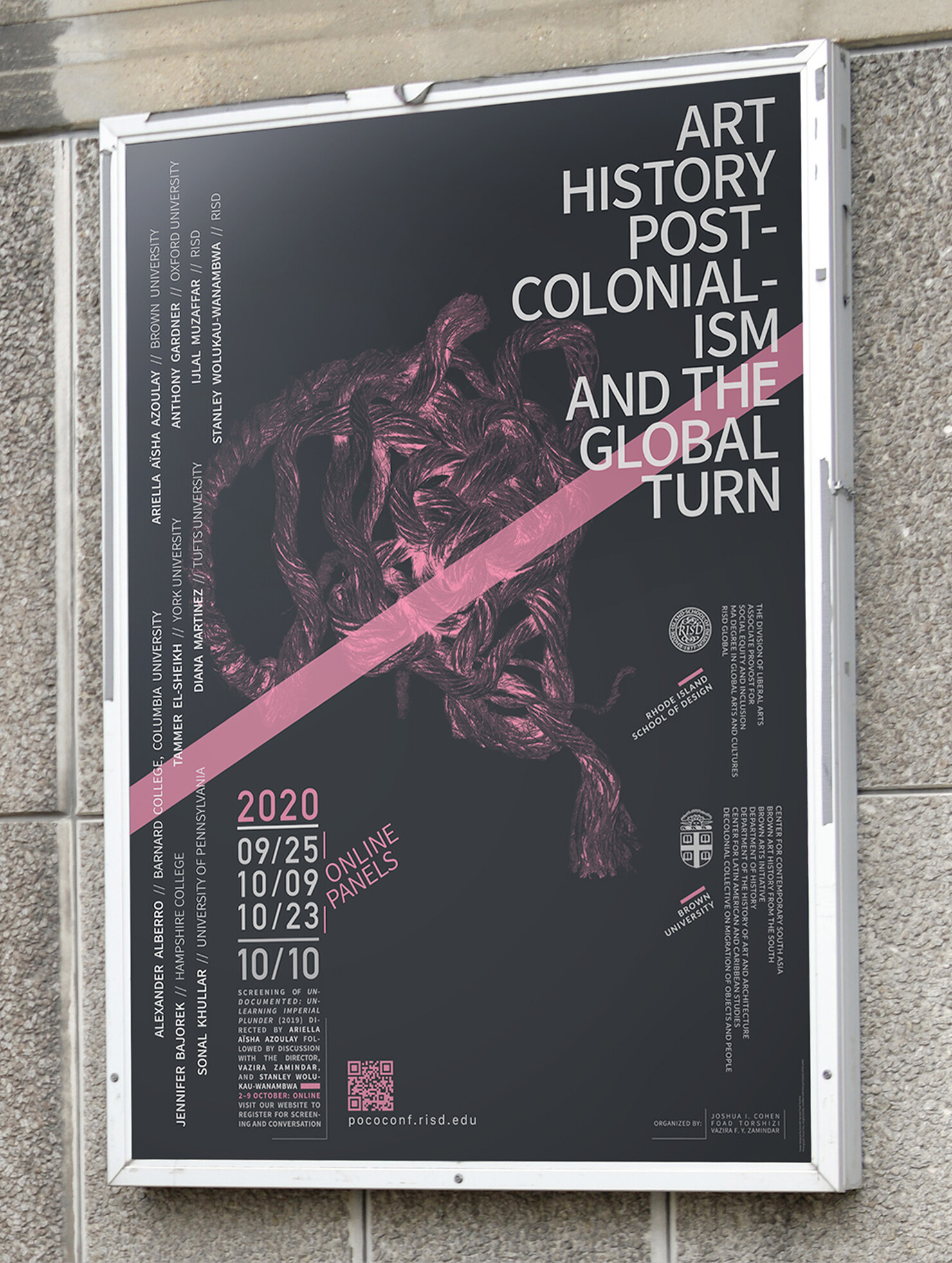Online conference, film screening, and conversation
September 25–October 23, 2020
As attention turns increasingly toward the “global” in art history, has postcolonialism fallen into obsolescence? Although touted as liberating, does the new “global” dispensation mark a rupture with history? What shall become of the generative critical theory that emerged in the 1980s and ‘90s, which partly grew out of reflections on anticolonial movements and post-independence nation-building? At best, global art history signals a germane awareness of “post-postcolonial” conditions precipitated by the accelerating globalization of finance capitalism. But would proponents of global contemporary art rather applaud putatively post-national freedoms than reckon with globalization’s deep disadvantages, while jettisoning the postcolonial as an allegedly outmoded product of elite theory?
This conference asks whether, or to what degree, postcolonial discourses stand to be recuperated and revised in 21st century art history, architectural history, visual studies, and art criticism. In cases where political alliances have frayed and nascent national governments foundered, radical politics have sometimes given way to disillusionment, while transnationalism, hybridity, and self-fashioning settle in as new norms. For some in the Global South, “postcolonial” may indeed appear misleading as an overall designation. Nevertheless, what could be the implications of moving past postcolonialism as we arguably celebrate a cosmopolitan world that has yet to be fully realized? With neoliberalism giving rise to what art historian Anthony Gardner has called “a resurgent focus on North Atlantic relations,” what would be the cost of letting the postcolonial slip away?
In other words, what does the early 21st century—so distant from the heyday of anticolonialism associated with Third World independence and liberation movements—hold for the practices and ambitions of artists, scholars, and critics? How have contemporary artists accommodated and/or resisted the demands of the global art world? What have the recent shifts in discourse meant—or what could they mean—for scholarly and curatorial (re)readings of chronologically staggered periods of culture clash and decolonization, including the possibilities, and failures of each moment? How might an ongoing or renewed “postcolonial” artistic output exceed the confines of galleries, biennials, art fairs, and museums? Do new interests in the “global” inevitably come at the expense of the postcolonial? Are the phenomena in question truly taking place on a global scale? Have scholars and artists from the Global South explored different terms and frameworks to structure their pursuits? To what extent are political limitations determined by working relationships with art institutions and their particular forms of patronage?
Registration required and limited to 300 per session.
Detailed schedule, speaker bios, paper abstracts, and registration for panels and film-screening: pococonf.risd.edu.
Schedule:
Panel one
September 25, 11am EST
Tammer El-Sheikh (York University)
Sonal Khullar (University of Pennsylvania)
Film screening
October 2–9: Register online.
Un-documented: Unlearning Imperial Plunder
Written and directed by Ariella Aïsha Azoulay
Panel two
October 9, 11am EST
Diana Martinez (Tufts University)
Jennifer Bajorek (Hampshire College)
Anthony Gardner (Oxford University)
Film conversastion
October 10, 11am EST
Ariella Aïsha Azoulay in conversation with Vazira Zamindar (Brown, History) and Stanley Wolukau-Wanambwa (RISD, Photography)
Panel three
October 23, 11am EST
Ijlal Muzaffar (RISD)
Alexander Alberro (Barnard College / Columbia University)
Organizers: Foad Torshizi (RISD), Joshua I. Cohen (CCNY), and Vazira Zamindar (Brown).
Sponsors: RISD Division of Liberal Arts; RISD MA Program in Global Arts and Cultures; RISD Associate Provost for Social Equity and Inclusion; RISD Global; Brown University, Center for Contemporary South Asia; Brown University, Art History from the South; Brown University, Department of History; Brown University, Brown Arts Initiative; Brown University, Department of History of Art and Architecture; Brown University, Center for Latin American and Caribbean Studies; Brown University, Decolonial Collective on Migration of Objects and People.
Contact: pococonf [at] risd.edu


